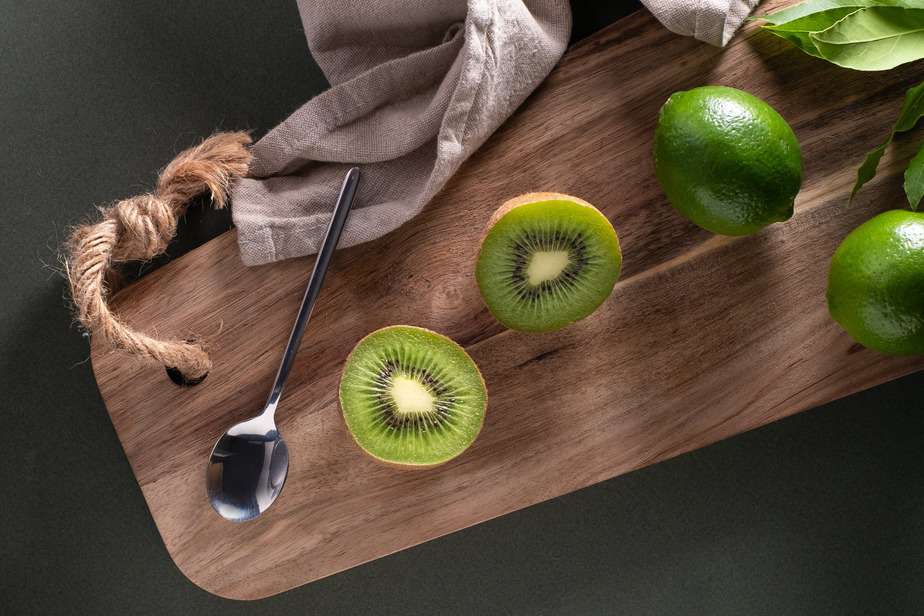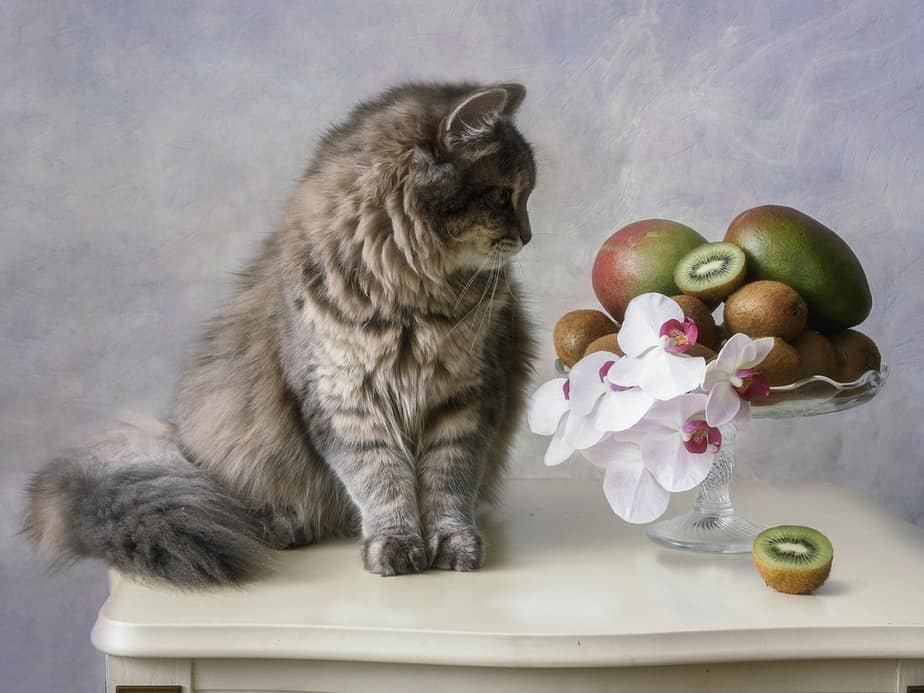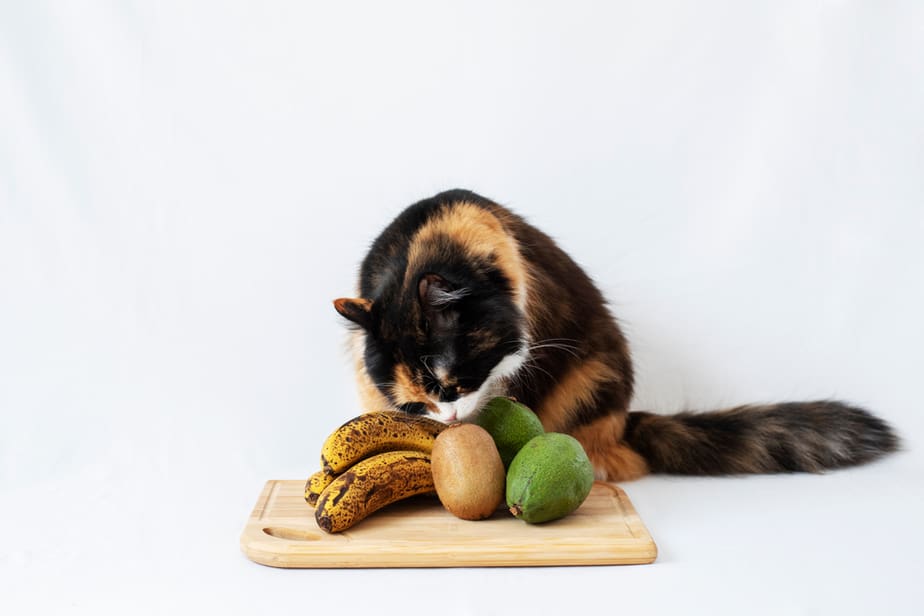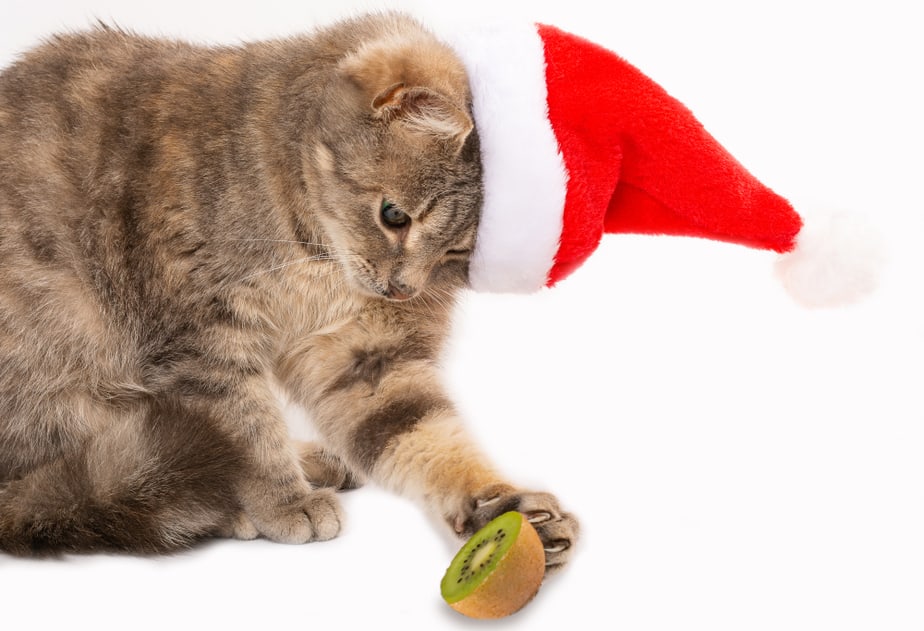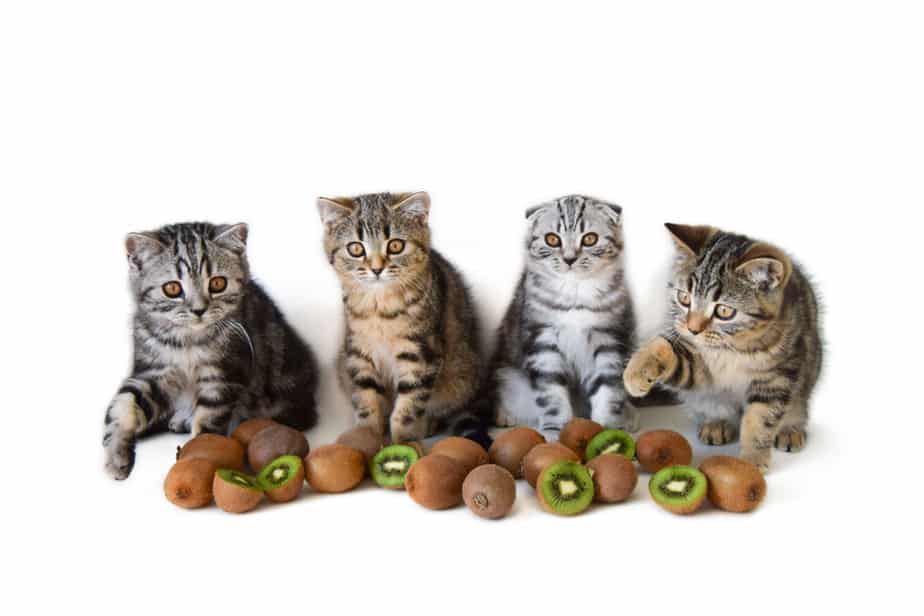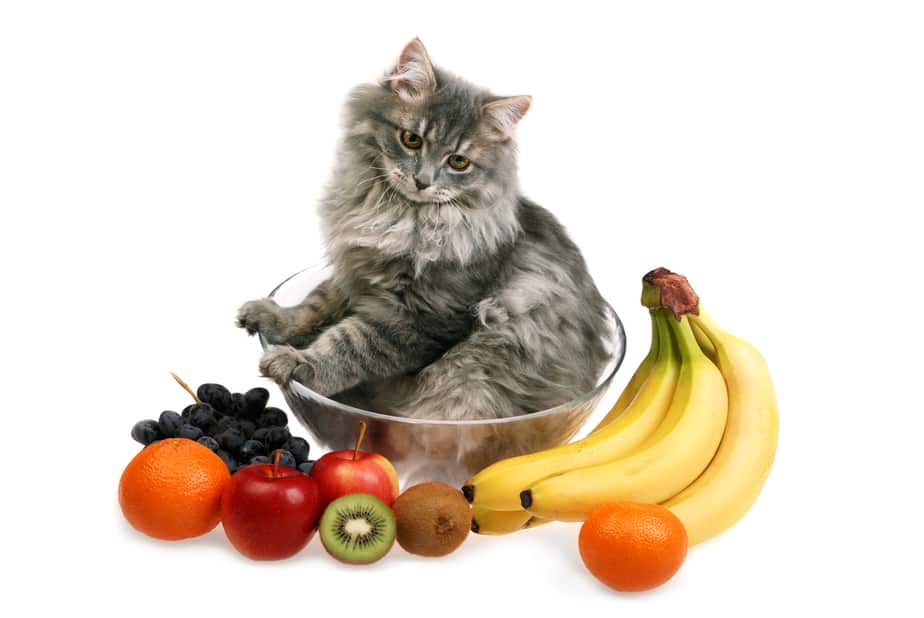📖 Table of Content:
No, cats can’t eat these flightless birds! Unless you’re asking about kiwifruit. Then the short answer is yes, cats can eat kiwi. This fruit is safe for your feline in moderation.
We have to thank China for kiwifruit as it’s native to central and eastern China. Kiwi is a fuzzy, oval-shaped fruit and a healthy choice of food. It’s rich in antioxidants as well as vitamins.
So, why or why not feed your cat kiwi?
Is kiwi toxic to cats?
It may look suspicious because of its unusual color and texture. Don’t worry though, because kiwi isn’t toxic to your furry friend. Moreover, kiwi can hold some health benefits for your little lap monster.
Humans’ best motto in life is “everything in moderation.” This can also be applied to cats, especially the greedy ones! Cats are ruled by their instincts and oftentimes, no matter how many times you feed her, she’ll continue eating!
So, to rather be safe than sorry, we have to control our furry friends’ diets. Giving too many fruits isn’t recommended, but neither is too much meat. A balanced diet is all a healthy feline needs.
Health benefits of kiwi
This large berry is full of immunity stimulators and offers an array of vitamins. The vibrant, green color of kiwi’s flesh looks full of life, and it is! Kiwi is reported to help prevent heart disease and stroke.
1. Vitamins
When it comes to your cat’s immune system, kiwi is a great booster. It’s rich in vitamin C which works as an immune-system-stimulator. Eating kiwi will cover the daily recommended vitamin C intake.
Next to regulating the immune system, vitamin C plays an important role in metabolic functions and helps with tissue growth. Kiwi’s health benefits may also extend to lowering blood pressure.
This fuzzy fruit is also full of antioxidants that help protect the body. Your pet is more protected from inflammation or disease because of the abundance of antioxidants found in kiwi.
Antioxidants perform important functions such as providing bone strength, helping joints, and preventing cancer and arthritis. Furthermore, cats can benefit from vitamin C in that it regulates kidney and urinary tract functions.
If your furkid has respiratory problems, or maybe asthma, eating kiwi can help her case. Another benefit of vitamin C is its collagen synthesis. Collagen production is what makes your fluff even fluffier! Her coat will shine and she won’t shed as much hair!
Another vitamin abundant in kiwi is vitamin A. The deficiency of this vitamin can lead to poor eyesight. And you don’t want that happening to a nocturnal animal!
Aside from these benefits, vitamin E found in kiwi also works as an antioxidant. Together with vitamin K, it helps to prevent blood clotting in arteries.
2. Fiber
In addition to vitamin C and antioxidants, this colorful berry works great for the problem of constipation. If your feline is experiencing this kind of discomfort, the dietary fiber in kiwi will help her digestive problems.
If you have a chunky kitten, this digestion stimulator will aid in losing weight as well. A small amount of kiwi will fill up her belly because of the dietary fiber. Besides that, kiwi is low in calories!
Additionally, fiber manages cholesterol levels. And as we all know, high cholesterol levels easily lead to heart problems.
3. Minerals
Minerals are an essential part of these healthy supplements as well.
For instance, calcium helps in bone development and will strengthen your feline’s bones, teeth, and claws. Another compound is iron, which helps hemoglobin production.
Copper, just like iron, forms red blood cells and blood vessels. A sufficient amount of copper and iron in blood will keep your feline away from the dangers of cardiovascular disease.
Manganese and folate minerals that are found in kiwifruit can benefit your cat by assisting in metabolizing proteins. A lack of these two can result in anemia, because they help in making red blood cells.
Then, selenium and potassium are essential minerals that play a role in muscle contractions.
If your cat likes kiwifruit, don’t stop her from eating it because she can safely indulge in it.
Disadvantages of kiwi
Unfortunately, with the good comes the bad, as always. Although kiwifruit is low in calories, it’s high in sugar and carbohydrates. Cats don’t require either of these two.
Although sugar in itself isn’t toxic to cats, it can create some problems. Excessive amounts of sugar and prolonged intake thereof can’t yield good results. Sugar consumption can quickly lead to tooth decay, obesity, and in the long term, diabetes.
For the sake of your feline’s health, make sure you feed her kiwi in moderation. Don’t get carried away with it because in severe cases, sugar consumption can cause heart disease.
Less is more, right? This is also the case with dietary fiber found in kiwi. Although it helps your feline with digestion, too much of it can have a bad impact on her intestines. An overabundance of dietary fiber causes diarrhea.
Moderation is key when feeding these fuzzy berries to your pet.
What about kiwi allergies?
She can eat kiwi, but cats may develop kiwi allergies. Granted, cats can be prone to allergies, but keep an eye on your feline chomping down on this oval fruit. Allergic reactions vary due to various reasons.
Not all cats are the same and have the same body, therefore the symptoms vary. Some of the mild symptoms involve skin rashes, itching of the skin, and aching of the tongue and mouth.
More severe symptoms include vomiting, swelling of the tongue and mouth, dizziness, and abdominal pain. Other common side effects are coughing, sneezing, and runny eyes and nose.
Symptoms differ and are unique to every feline, so if you’re in doubt and your furry friend isn’t her usual self, take a trip to the vet.
Can cats eat kiwi skin?
Kiwi skin is no different than the flesh of kiwifruit. It holds a certain amount of nutrients. Despite the skin being edible, it’s often peeled. Kiwi’s fuzzy skin and its pungent taste aren’t the favorite part of this fruit.
So, even though the skin of a healthy kiwi is technically edible, eating it isn’t advised for cats. Instead, to make this fruit even more interesting, you can serve it in other ways.
Chop it up for your furry companion and offer her this healthy snack. Or you can go a step further and make a smoothie out of kiwi and some other fruits. For example, strawberries would make a perfect addition because they are safe for cats too.
Can cats eat kiwi seeds?
You might have never thought about this part of kiwi. Being a cat owner, you have to be prepared for everything! Those mischievous little whiskers can get themselves into all sorts of trouble!
No need to panic – kiwi seeds are totally edible! And yes, cats can eat kiwi seeds too. Just like this fruit’s flesh, seeds are a great source of vitamins and minerals.
However, seeds aren’t as helpful as the flesh of the fruit and won’t supply your feline with as many supplements.
Other fruits cats can eat
Next to kiwi, cats can eat other fruits such as apples, blueberries, bananas, strawberries, watermelons, and others. You can blend these into smoothies or chop them up into a mini fruit salad.
Cats will enjoy these fruits, especially in the hot summer. You can pair them with some Greek yogurt, but don’t go overboard. Fruits should be given in moderation to carnivores.
Fruits cats can’t eat
Sadly, there are some fruits our kitties aren’t allowed to eat. For instance, citrus is forbidden. Fruits such as lemons, limes, and oranges can have a bad impact on your pet.
Citrus fruits contain oils and other parts that make these fruits inedible for cats. Common side effects found in cats include diarrhea, vomiting, and digestive irritation.
Other fruits that are off-limits for felines have a more severe impact on them. If your pet is ever to eat grapes or raisins, look out for signs of toxicity.
The intake of raisins or grapes can be dangerous. They produce similar symptoms as those of citrus fruit, but only intensified. Ingestion of these can lead to more severe cases such as kidney failure.
So, beware of your cat’s whereabouts. Don’t just assume that because cats can eat kiwis, they can eat everything. The same rule that applies for kiwi and other edible fruits, doesn’t necessarily apply to a whole fruit basket.
Bottom line
Kiwi is a healthy, fuzzy fruit that is safe for your cat to eat. While the external appearance may not be very enticing, the vibrant green color on the inside makes up for it.
Its abundance of vitamins, minerals, and other healthy, beneficial supplements make it a great choice of fruit. This package of nutrients serves as an immunity boost for your feline. It boosts her overall health, from her shiny coat on the outside, to the red blood cells on the inside.
As with any other fruit, kiwi is best eaten in moderation. That way, you can dodge the unwanted side effects of sugar exuberance.
Negative effects can occur if cats ingest too much kiwifruit. Keep your furbaby’s diet plan balanced and kiwi as an addition. Remember that less is more.
Keep your pet’s diet balanced and your four-legged companion healthy and happy. Some cats can develop an allergy to this fruit and in that case, it’s best to contact your vet before offering her any.
You can never be too cautious when it comes to these curious creatures! Weigh the advantages and disadvantages because every little creature is unique, and so are their needs.
Read more: Can Cats Eat Dates? Sweet Treats Or Hazardous Food
